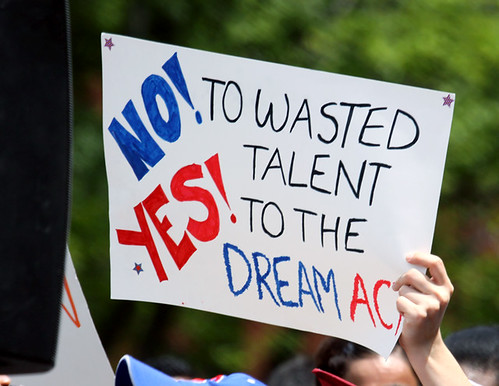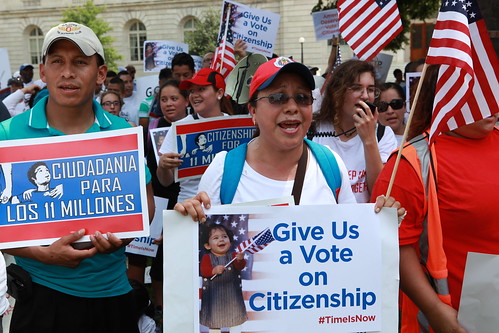 |
| DREAM activists in North Carolina. Photo credit: Justin Valas, 2010 |
Many young immigrants face a similar shock when they see their college bill for the first time and realize that they'll have to drop out of school before they even start because they can't afford it. Some students realize this in high school and give up, seeing no point in doing well in school and finishing their secondary education if they can't afford college. A college degree is key to success in the United States. But with little hope of accessing college, some undocumented youth have even committed suicide out of hopelessness.
I'm grateful that the Maryland DREAM Act offers Daniel and other young immigrants an avenue for getting in-state tuition; however, it is a confusing, bureaucratic process. I'm working with Daniel to get his paperwork together this month, but, because he just found out about the process and school starts in a few weeks, he may have to wait until next spring to start college.
 |
| A DREAM Act supporter holds a poignant sign. Photo credit: ShoreShot Photography. |
Thanks to Obama's executive order, undocumented immigrants who were brought to the US as children can apply for DACA (Deferred Action for Childhood Arrivals) and attain legal residency. However, this process also carries with it a mountain of red tape and a large $465 fee (which is cost-prohibitive for many low-income immigrants). It's still up for debate, though, whether or not DACA recipients qualify for in-state tuition. The University System of Georgia, for example, denies DACA students in-state tuition.
The University of Virginia, my alma mater, similarly charges undocumented students out-of-state tuition. UVa tuition for the upcoming school year is $38,026 for out-of-state students and $15,672 for in-state students. The ACLU says it's illegal for UVa and other colleges to discriminate against undocumented students in this way, and they successfully won the right for one undocumented student to get in-state tuition. Other students, however, aren't so lucky.
 |
| Rally last month in DC for immigration reform. Photo credit: Rick Reinhard, 2013 |
This is just another reason why we need to pass comprehensive immigration reform on a national level and make college more affordable for everyone. If undocumented youth are given legal status, then they can prove their legal in-state residency. I'm lucky that I didn't have to sign an affidavit and prove that my parents paid state income tax over the past three years just to pay in-state tuition.** No one ever questioned my legality. Education is a right is a right that should be accessible for all, regardless of what papers they have.
---
* Name changed to maintain confidentiality
** These are part of the requirements of the Maryland DREAM Act.